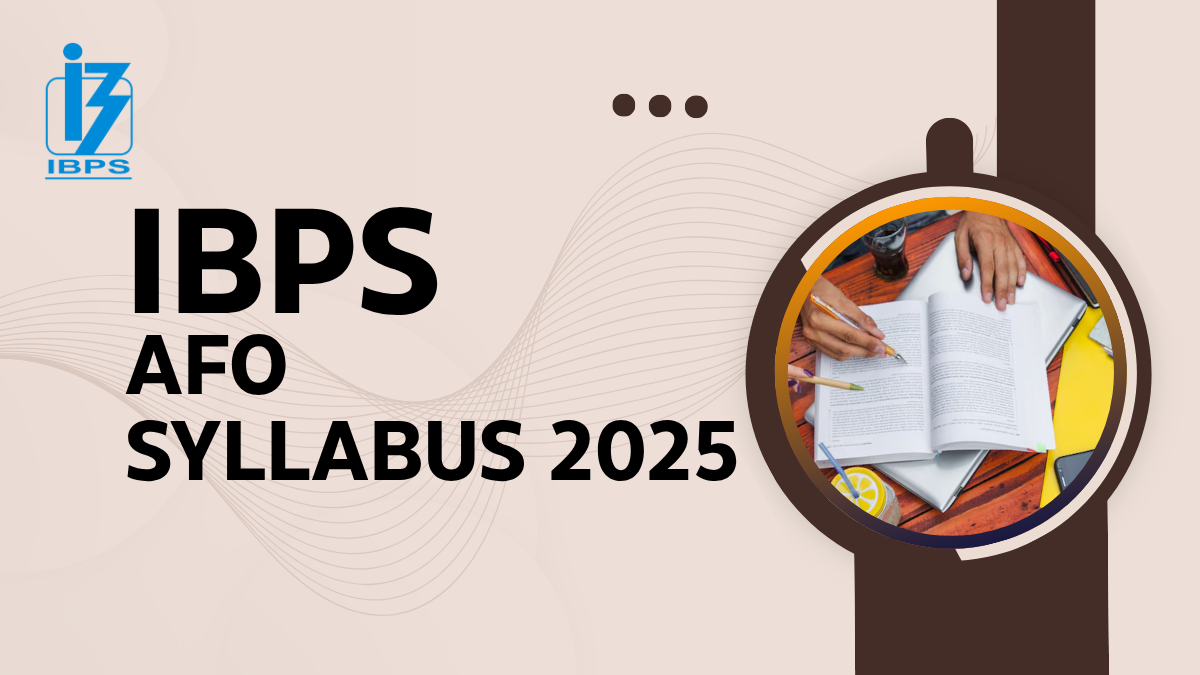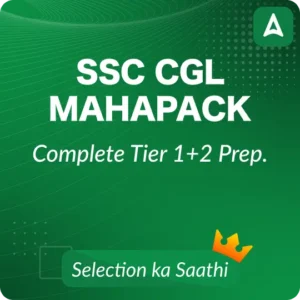IBPS AFO Prelims Exam Pattern 2025
The IBPS AFO Exam Pattern 2025 is designed to assess candidates’ knowledge and skills through a structured format.
- The exam consists of a total of 150 questions worth 125 marks.
- Candidates will be allotted two hours to complete the exam.
- A key aspect of the exam is the negative marking system: for each incorrect response, one-fourth of the total marks assigned to the question will be deducted.
Familiarizing yourself with this exam pattern is essential for effective preparation, as it follows a structure similar to other IBPS exams. Understanding the number of questions, time constraints, and the scoring procedure allows candidates to plan their strategy efficiently, helping them manage time and minimize errors to enhance their overall performance.
| IBPS AFO Prelims Exam Pattern | |||
| Subjects | No. of Questions | Total Marks | Duration |
| Reasoning | 50 | 50 | 40 minutes |
| English Language | 50 | 25 | 40 minutes |
| Quants | 50 | 50 | 40 minutes |
| Total | 150 | 125 | 120 minutes |
IBPS AFO Mains Exam Pattern 2025
| IBPS AFO Mains Exam Pattern | ||||
| Subject | No. of Questions | Marks | Duration | Mode of Exam |
| Professional Knowledge | 60 | 60 | 45 minutes | Online |
IBPS AFO Syllabus 2025 For Prelims
1. Reasoning
- Seating Arrangements
- Puzzles
- Inequalities
- Syllogism
- Input-Output
- Data Sufficiency
- Blood Relations
- Order and Ranking
- Alphanumeric Series
- Distance and Direction
- Verbal Reasoning
2. English
- Cloze Test
- Reading Comprehension
- Spotting Errors
- Sentence Improvement
- Sentence Correction
- Para Jumbles
- Fill in the Blanks
- Para/Sentence Completion
3. Quantitative Aptitude
- Number Series
- Data Interpretation
- Simplification/ Approximation
- Quadratic Equation
- Data Sufficiency
- Mensuration
- Average Profit and Loss
- Ratio and Proportion
- Work, Time, and Energy
- Time and Distance
- Probability
- Relations
- Simple and Compound Interest
- Permutation and Combination
IBPS AFO Syllabus 2025 For Mains
The Mains exam evaluates candidates’ professional knowledge in agriculture, which is essential for the role of Agriculture Field Officer. A strong understanding of agricultural topics is vital for success in this exam. For a detailed syllabus of the Mains exam, please check the information provided below.
1. Basics of crop production
- Agriculture in India
- Types of Cultivation
- Major Crops of India
- Irrigation in India
- Agriculture-based Research Institutes in India
- Animal Husbandry in India
- Genetically Modified Crops, etc.
2. Horticulture
- Amateur horticulture
- Commercial horticulture
- Horticulture fruits and vegetables
3. Seed Science
- Basics of Seed Science
- Different Seed Tests
4. Agriculture Finance
- Short-term Loans
- Medium/Long-terms Loan
- Crop Loan and Kisan Credit Card
- Agricultural Term Loan
- Land Development
- Minor Irrigation
- Farm Mechanisation
- Finance to Horticulture
- Land Purchase
- Lead Bank Scheme
- Agriculture Advances
- Advance Against Warehouse, Receipts
- Produce Marketing Scheme
- Crop Insurance Scheme
- Rashtriya Krishi Bima Yojana
- Financing of combined harvesters
- Financing of Tractors and Old Tractors
- Advance against Gold//Silver ornaments
- River Lift Irrigation Schemes
- Forums for Coordination
- Service Area Approach
- State Level Bankers Committee (SLBC), Preparation of Credit Plan
5. Cultivation and Harvesting
- Cultivation Techniques and Practices
- Harvesting Techniques and Practices
- Post-Harvest Technology
6. Agricultural Practices
- Soil preparation
- Sowing
- Manuring
- Irrigation
- Weeding
- Harvesting
- Storage
7. Soil science
- Tillage, Nutrient deficiencies, Fertilizer, and Fertilizer consumption
- Soil Types and Characters
- Indian soil
- Type of facts soil-related fact
- Green manure
8. Agriculture Economics
- Basics of Agriculture Economics
- Agriculture cost and scheme
9. Irrigation Methods
- Lift Irrigation
- Drip Irrigation
- Sprinkler Irrigation
10. Self Help Groups
- Introduction
- Need Structure and Functions of Self-Help Group
- Self-Help Groups and SGSY Scheme
11. Government Schemes
- Swarnajayanti Gram Swarozgar Yojana (SGSY)
- Million Wells Scheme (MWS)
- Swarna Jayanti Shahari Rozgar Yojana
- Urban Self Employment Programme (USEP)
- Urban Women Self-Help Programme (Revolving Fund)
- Skill Training for Employment Promotion Amongst Urban Poor (STEP-UP)
- Urban Wage Employment Programme (UWEP)
- Urban Community Development Network (UCDN)
- Community Structures Urban Programme for Poverty Reduction amongst SCs and STs (UPPS)
- Prime Minister’s Employment Generation Programme (PMEGP)
- Prime Minister’s Rozgar Yojana (PMRY)
- Scheme of Liberation and Rehabilitation of Scavengers (SLRS)
- Self-Employment Scheme for Rehabilitation of Manual
- Scavengers (SRMS)
12. Miscellaneous
- Plant Pathology
- Entomology
- Rearing of animals
- Agricultural Machinery
- Dairy Science
- Important points regarding plants, fruits, vegetables
- Different Diseases
- Agriculture Current Affairs
- Different insurance schemes regarding agriculture
- Animal husbandry and technology.
IBPS AFO Exam Preparation Tips
To effectively prepare for cracking the IBPS AFO Exam successfully, consider the following tips:
- Review Previous Year’s Questions (PYQs): Check the past question papers to understand the exam’s difficulty level and question format.
- Understand the Exam Pattern and Syllabus: Get acquainted with the latest exam trends by reviewing the exam pattern and syllabus. Detailed information is available in the article above.
- Select Study materials wisely: Choose relevant online resources and reference books that comprehensively cover the syllabus.
- Take Regular Mock Tests: Simulate exam conditions with online mock tests to practice time management and handle exam pressure effectively.
- Ensure Concept Clarity: Develop a strong understanding of key concepts before taking mock tests. Focus on areas where you need improvement.
- Revise Thoroughly: Regular revision is essential to reinforce your knowledge and improve retention, which is paramount for excelling in the exam.
| Related Articles | |
| IBPS AFO eligibility criteria | IBPS AFO syllabus |
| IBPS AFO Salary | Preparation Tips for the IBPS AFO exam |
| IBPS AFO 2025 Notification | |




 RSMSSB Agriculture Supervisor Recruitmen...
RSMSSB Agriculture Supervisor Recruitmen...
 IBPS AFO Mains Cut Off 2025 Out, Check C...
IBPS AFO Mains Cut Off 2025 Out, Check C...
 IBPS RRB Agriculture Officer Exam Date 2...
IBPS RRB Agriculture Officer Exam Date 2...




 Adda247 Job portal has complete information about all Sarkari Jobs and Naukri Alerts, its latest recruitment notifications, from all state and national level jobs and their updates.
Adda247 Job portal has complete information about all Sarkari Jobs and Naukri Alerts, its latest recruitment notifications, from all state and national level jobs and their updates.



